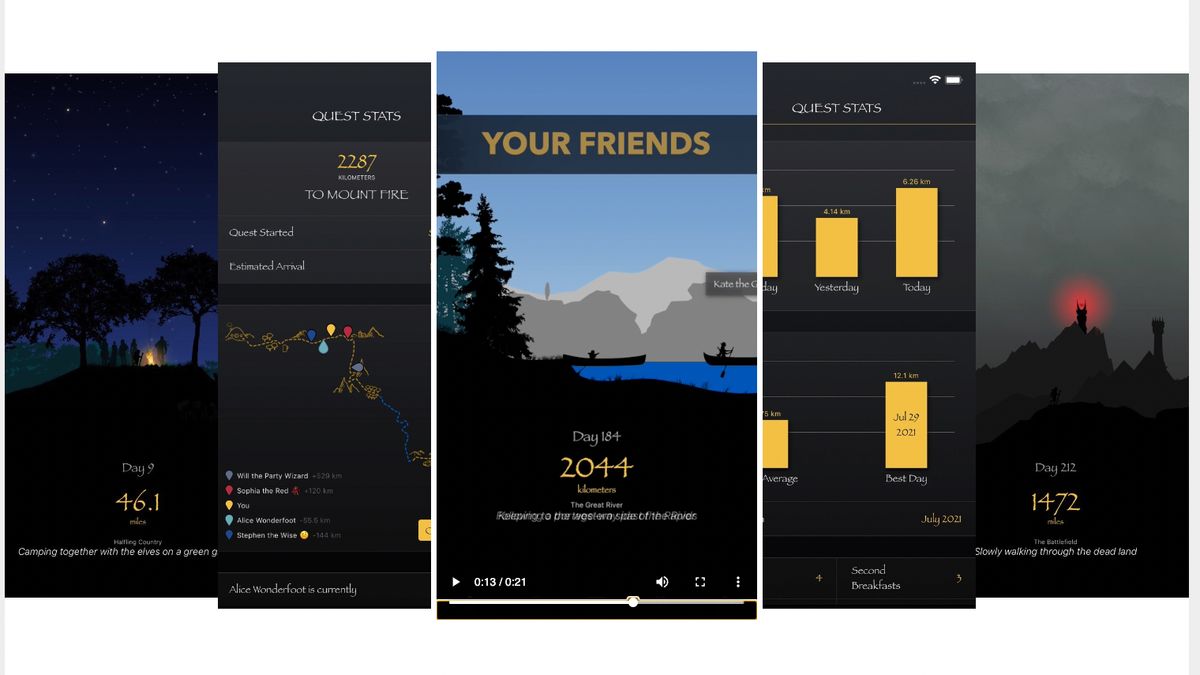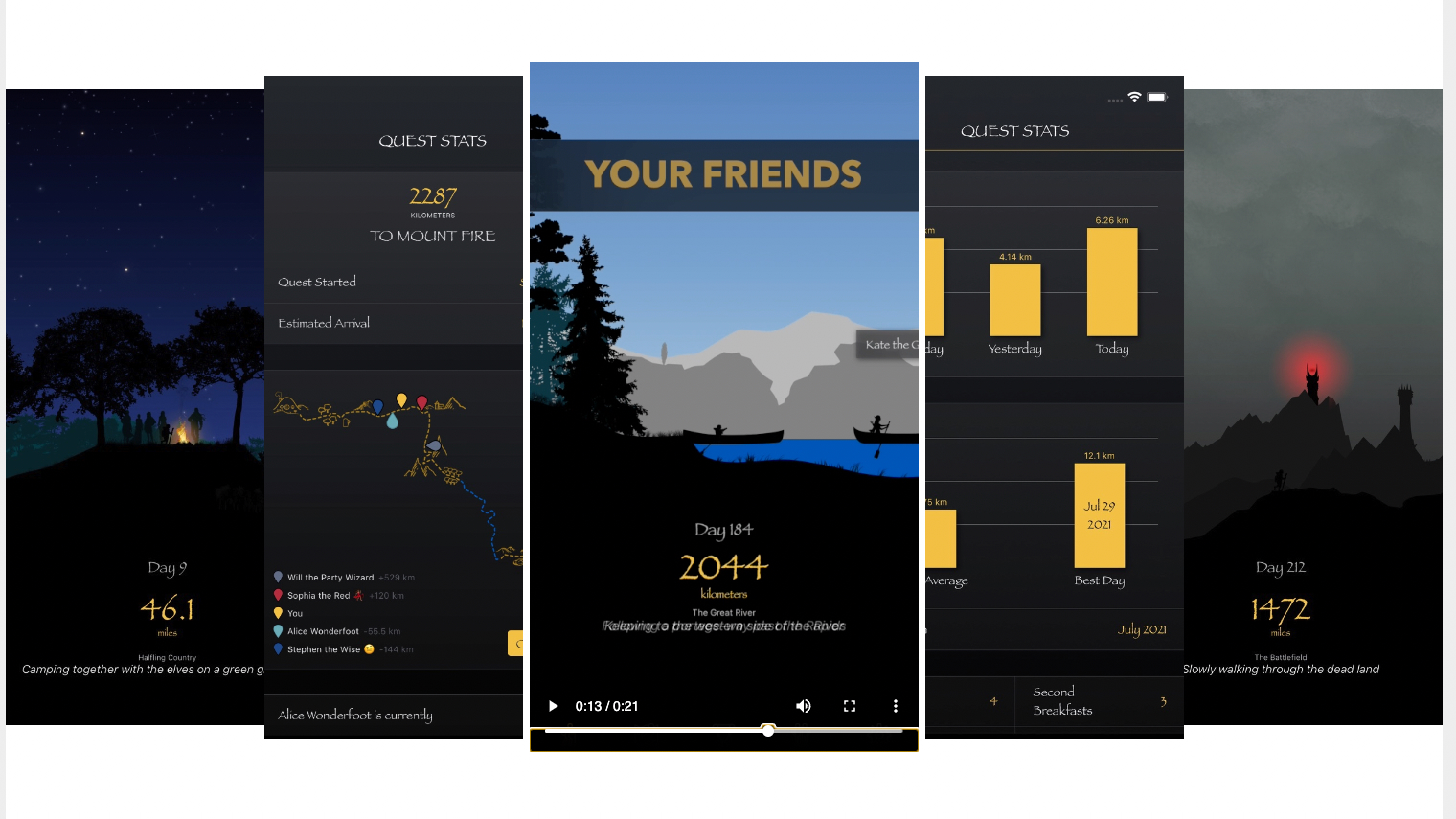Sunday Runday(Image credit: Android Central)In this weekly column, Android Central Wearables Editor Michael Hicks talks about the world of wearables, apps, and fitness tech related to running and health, in his quest to get faster and more fit.My high school running coach told us that music was a crutch. What he didn’t tell us was that adult responsibilities, a 40-hour workweek, and the temptation of video games would make finding the time and motivation for running really difficult! Nowadays, I’m perfectly happy to hunt for the best running apps and playlists to serve as that motivational crutch. Below, I’ll focus on the running and step-tracking apps I use (or have used and enjoyed) that provide audio motivation, training planning (and shaming), social motivation, and everything else you can use to get yourself out the door, running at the right pace and sustaining that effort long enough to improve.My favorite audio motivation appsI’ll start with the obvious: A good music playlist is the difference between getting into the zone and feeling demoralized by your ragged, panting breath during hard runs. I’m not going to advocate for a specific music streaming app, but most of the big ones have curated workout playlists matched to specific heart rates or genres.A running coach might tell you not to rely on music, but I think it’s fine if you use it safely — try bone conduction or open-ear headphones like Shokz OpenFit so you hear your surroundings — and don’t overtrain to match up-tempo songs. I try to curate my own hours-long playlists for different race lengths or training types, so I have a comfortable familiarity with what’s coming instead of being thrown off by new, popular songs that aren’t my cup of tea.Beyond music, you might be surprised to learn that Audible is one of my most-used running companions. Whenever I’m marathon training and upping my mileage, the daily hours on the trail can get dull after a while, and I use the time to sink into old favorites that will entertain but not distract. My Wheel of Time series re-listen has carried me through dozens of runs and post-run walks.(Image credit: ZRX / Marvel)You can’t go wrong with Zombies, Run! and Marvel Move. The decade-old app began with a simple premise — if you slow down, virtual zombies would scare you back on pace or “eat” you if you failed — but has added hundreds of audio-drama missions about post-apocalyptic survival as a runner. More recently, they licensed Marvel missions where you’re teamed up with Thor and Loki, the X-Men, and other popular heroes. I love using these missions for hard-paced tempo and track runs; while Audible is relaxing but can be distracting, these missions come in short bursts of entertainment that keep you in the zone, but don’t overstay their welcome before switching back to your music. Get the latest news from Android Central, your trusted companion in the world of AndroidOtherwise, if you’re looking for more traditional audio coaching, I’m not as familiar with the couch-to-5K apps out there because I’ve been running 5K+ for a couple of decades, but I’ve heard very good things about Aaptiv’s personalized coaching cues.My favorite training and walking apps(Image credit: Michael Hicks / Android Central)All the music and coaching apps above motivate you once you’ve already decided to run. But for those exhausted days where slacking off sounds more appealing? You’ll need some kind of positive (or negative) reinforcement to force yourself to gear up and step outside, whether for running or walking.I’m a fan of tracking systems like Fitbit’s Active Zone Minutes or Garmin’s Intensity Minutes, which give you a weekly goal to hit and a recommended daily workout, but take context into account and tell you to rest if you’re physically exhausted. For comparison, a daily ring-closing system like Apple’s or Samsung’s will tell you to work out for 30 minutes without fail, even the day after a marathon, which makes me want to ignore it.More specifically, I like Fitbit’s hourly move reminders, which stop me from being too stiff and sedentary throughout the day. With Garmin, I use its watches’ daily suggested workouts to boost my VO2 Max, or my body’s ability to convert oxygen into energy. I didn’t like seeing my VO2 Max dipping low during the pandemic, so I followed its suggestions for track workouts and low aerobic runs until I had climbed five points from “Good” to “Excellent” for my age.(Image credit: Michael Hicks / Android Central)Unfortunately, you need a Garmin Forerunner watch or Fitbit tracker to access these tools, and I want to focus on apps that anyone can use for motivation, regardless of which fitness watch you own. I make a point to go out daily, whether for walks or runs, to hit 10,000 steps a day (or close to it). Sometimes, I’ll feel too tired to run, but after starting a walk, I’ll realize I do have enough energy. If I don’t, I look to apps like Fantasy Hike — a copyright-safe quest to walk to Mount Doom Fire like the Fellowship of the Ring — that make every step and mile feel meaningful, even if I’m not running. I just wish it wasn’t iOS-exclusive.(Image credit: Forge7)Walk the Distance doesn’t have the fantasy hook, but the premise of adding up your miles and steps to have you virtually hike the Appalachian Trail and compete with other hikers should give Android and iOS users some nice motivation. The same goes with cute apps like Pikmin Bloom, where more steps equals more Pikmin companions in your team, or more general goal-setting apps like Finch where you can take care of your pet by taking care of yourself. Otherwise, I’d say don’t be afraid to go lo-fi for your training tracking. This year, I’m using a Google doc to log how many runs, miles, and steps I’ve completed per month to see if I’m on track to hit my yearly goals. Not everything needs to go through a specific app!My favorite social training apps(Image credit: Michael Hicks / Android Central)It’s hard to recommend any of the best running apps because (A) they’re all quite similar in what they offer, and (B) which you pick will depend on which app your fellow runners or walkers use. Strava, MapMyRun, Runkeeper, Nike Run Club, and the rest have their strengths with community maps, live segments, leaderboards, coaching, running clubs, and so on. But it’ll be a lonely experience if you pick the wrong app, so I’d say wait to join your local in-person running club and see what they use.I like Strava’s focus on segments, which has you competing with local runners in both pace and number of times completed. I’ve battled to be the local legend at the nearest track with a few other runners, for example, and I like competing against others (and myself) on the segments within my favorite running routes, since Strava has a partnership with Garmin to show Live Segments on the Forerunner 965.I can’t say for certain which app will work best for you. Some people need competition with friends (or strangers), while others prefer a game or fantasy scenario that makes every mile feel more meaningful. Beginner runners may need more in-depth coaching, while veteran runners will want AI-based training plans like Garmin Coach based on their fitness level.What matters, in my mind, is that you need to find a concrete, positive goal. Simply telling yourself to walk or run every day will inevitably lead to you losing motivation or overtraining until you hurt yourself. But if you’re racing your loved ones to Mordor while working through your audiobook or podcast backlog, you’re setting yourself up to succeed! Or for more serious runners, aiming for concrete fitness goals — like the most miles in your Strava group or a significant VO2 Max boost — is more likely to succeed than just trying to run hard every single day.
Need running motivation? These are my favorite apps for getting outside and on PR pace


